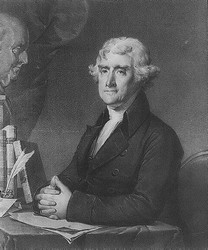Presidency Of Thomas Jefferson
|
| updated |
Copy Link Code
|
 By the time of the election of Thomas Jefferson as the third President of the United States, the federal government of this nascent nation had taken on powers that reached far beyond what many had envisioned as republican democracy. Thomas Jefferson's presidency would thus be dedicated to his anti-Federalist mission of reducing the role of government and returning many enumerated powers to the states. For the supporters of Thomas Jefferson, election of 1800 was a bloodless revolution against the overreaching Federalist administration of John Adams and the wicked Alien and Sedition Acts that had imprisoned hundreds of citizens. As for President-elect Thomas Jefferson, 1800 was the culmination of a decade long effort to dethrone the so-called High Federalists who had assumed near dictatorial powers and established a massive bureaucracy in the capital. Although he was committed to reversing his predecessor's efforts at accumulating power in the federal government, Jefferson also understood the value of cooperation; he retained a number of moderate Federalists in non-Cabinet positions in an effort to assuage any fears of retaliation. Thomas Jefferson policies would show a reasoned approach that relied on popular support, something that Federalists considered crude and unnecessary with such an uneducated electorate. The populist message of the Thomas Jefferson administration, including liberty and self-governance, would survive to the present; the Federalists, however, had ultimately assured their own party's demise.
By the time of the election of Thomas Jefferson as the third President of the United States, the federal government of this nascent nation had taken on powers that reached far beyond what many had envisioned as republican democracy. Thomas Jefferson's presidency would thus be dedicated to his anti-Federalist mission of reducing the role of government and returning many enumerated powers to the states. For the supporters of Thomas Jefferson, election of 1800 was a bloodless revolution against the overreaching Federalist administration of John Adams and the wicked Alien and Sedition Acts that had imprisoned hundreds of citizens. As for President-elect Thomas Jefferson, 1800 was the culmination of a decade long effort to dethrone the so-called High Federalists who had assumed near dictatorial powers and established a massive bureaucracy in the capital. Although he was committed to reversing his predecessor's efforts at accumulating power in the federal government, Jefferson also understood the value of cooperation; he retained a number of moderate Federalists in non-Cabinet positions in an effort to assuage any fears of retaliation. Thomas Jefferson policies would show a reasoned approach that relied on popular support, something that Federalists considered crude and unnecessary with such an uneducated electorate. The populist message of the Thomas Jefferson administration, including liberty and self-governance, would survive to the present; the Federalists, however, had ultimately assured their own party's demise.
The career of Thomas Jefferson, before presidency and after the War of Independence, included a diplomatic post in France, four years as Thomas Jefferson, Secretary of State under George Washington and one term as Vice President after narrowly losing the election of 1796 to John Adams. Before the Revolutionary War, Jefferson had been a successful lawyer and politician in his home state of Virginia where he was a leader in the House of Burgesses and would eventually be chosen as a delegate to the Second Continental Congress in 1775 to replace Peter Randolph, another leader of the House of Burgesses. It was there in Philadelphia that Jefferson was nominated to author the Declaration of Independence as part of the Committee of Five that included such prominent members as Benjamin Franklin and John Adams, who quickly became Jefferson's close friend. Only after years of bickering over the most practical and ideal form of democratic government would Adams and Jefferson become heated rivals instead of trusted friends. President Thomas Jefferson in office represented a victory for the opposition after Adams failed to convince the nation of his Federalist notions.
The presidency of Thomas Jefferson included a number of challenges and opportunities which he met with vigor. The accomplishments of the Thomas Jefferson years in office include the Louisiana Purchase, the Lewis and Clark Expedition, and a raid on the Barbary pirates. There were two Thomas Jefferson terms in office, consecutively, beginning with the Thomas Jefferson term of 1801-1805. The accomplishments of Thomas Jefferson, after presidency, include the founding of the University of Virginia and some published works. In a letter of the elder Thomas Jefferson, church and state separation is established as a founding principle of the nation. He died on July 4th, 1826, only hours before the passing of his old friend and rival, John Adams.
